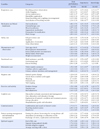Abstract
Purpose
Purpose of the study was to investigate task performance, importance, knowledge, and level of job stress and job satisfaction of nurses working in a hospital with no family or family paid auxiliary caregivers.
Methods
Participants were 119 nurses working in hospitals with no guardians. The questionnaire contained 488 items: general characteristics, performance, importance, knowledge of nursing tasks, job stress and job satisfaction. Data were analyzed using descriptive statistics and Pearson correlation coefficients with SPSS/WIN 21.0.
Results
Most frequently performed nursing tasks were patient nursing management and information management. Nursing tasks perceived as most important were medication and transfusion and nursing tasks with the highest knowledge were also medication and transfusion. Nursing task (subcategory) most frequently performed was oral medication. Nursing task (subcategory) perceived as most important was mental status observation and nursing task (subcategory) with the highest knowledge was vital sign check. Nurses' job stress was significantly associated with job satisfaction. The mean scores for nurses' job stress and job satisfaction were low.
Figures and Tables
Table 2
Task Performance, Importance and Knowledge of Participants by 12 Categories of Nursing Tasks (N=119)

References
1. Shin KA. Defamilization of elderly care and the experiences of the aged. Korean J Sociol. 2011; 45(4):64–96.
2. Ministry of Health and Welfare. Minister of Health and Welfare, Jin Young, "I will make the hospitals with no guardian." [Internet]. Seoul: Ministry of Health and Welfare;2013. Cited 2015 February 25. Available from: http://www.mw.go.kr/front_new/al/sal0301vw.jsp?PAR_MENU_ID=04&MENU_ID=0403&CONT_SEQ=288740&page=1.
3. Hwang NM. An analysis of the debates on introduction of public caregivers' services in acute medical centers. Health Welf Policy Forum. 2010; 170:60–71.
4. Hwang NM, Go DK. Status and improvement of caregivers' utilization in general hospital. Policy Report. Seoul: Korea Institute for Health and Social Affairs;1998. Report No.: 98-07.
5. National Health Insurance Service. Briefing materials of hospital with no guardian demonstration project [Internet]. Seoul: National Health Insurance Service;2013. cited 2015 February 25. Available from: http://www.nhis.or.kr/bbs7/attachments/2694.
6. Ministry of Health and Welfare. 2014 work plan of Ministry of Health and Welfare [Internet]. 2014. Cited 2015 February 25. Available from: http://download.mw.go.kr/front_new/modules/download.jsp?BOARD_ID=140&CONT_SEQ=297416&FILE_SEQ=146077.
7. Holden RJ, Scanlon MC, Patel NR, Kaushal R, Escoto KH, Brown RL, et al. A human factors framework and study of the effect of nursing workload on patient safety and employee quality of working life. BMJ Qual Saf. 2011; 20(1):15–24. DOI: 10.1136/bmjqs.2008.028381.
8. Rafferty AM, Clarke SP, Coles J, Ball J, James P, McKee M, et al. Outcomes of variation in hospital nurse staffing in English hospitals: Cross-sectional analysis of survey data and discharge records. Int J Nurs Stud. 2007; 44(2):175–182. DOI: 10.1016/j.ijnurstu.2006.08.003.
9. Kim YJ. Nurses perform all patients' care, patients and guardians are touched by hospitals with no guardian. . Hankyoreh Newspaper;2013. 02. 07. Sect. 01. Available from: http://www.hani.co.kr/arti/society/health/573218.html.
10. Choi CH. Gyeonggi-do medical centers (hospital with no guardian) have run into problems due to shortage of nurse. Maeil Business Newspaper;2014. 02. 19. Sect. 01. Available from: http://vip.mk.co.kr/news/view/21/21/2070172.html.
11. Han SS, Kim MH, Yun EK. Factors affecting nursing professionalism. J Korean Acad Soc Nurs Educ. 2008; 14(1):73–79.
12. Kim MR, Seomun GA. Relationships among burnout, job satisfaction, organizational commitment and turnover intention to resign in hospital nurses. Korean J Occup Health Nurs. 2013; 22(2):93–101. DOI: 10.5807/kjohn.2013.22.2.93.
13. Gil HH. Job analysis of the nursing care service in hospital without a guardian [master's thesis]. Seoul: Hanyang University;2011.
14. Choi JS, Kim JS. Nurses'perception, knowledge, and it's affecting factors on performance of nursing practice in hospital with no guardian. J Korea Contents Assoc. 2013; 13(10):403–411. DOI: 10.5392/JKCA.2013.13.10.403.
15. Chang SJ, Koh SB, Kang DM, Kim SA, Kang MG, Lee CG, et al. Developing an occupational stress scale for Korean employees. Korean J Occup Environ Med. 2005; 17(4):297–317.
16. Slavitt DB, Stamps PL, Piedmont EB, Haase AM. Nurses' satisfaction with their work satisfaction. Nurs Res. 1978; 27(2):114–120.
17. Lee HJ, Kim SN, Sohn IS, Han SS. A study of the degree of duty satisfaction according to the nurses's characteristics. J Korean Acad Nurs Adm. 2000; 6(1):5–18.
18. Kim MH. A study on the factors affecting the view of nursing as professionalism [master's thesis]. Seoul: Kyung Hee University;2008.
19. Kim MA, Park KO, You SJ, Kim MJ, Kim ES. A survey of nursing activities in small and medium-size hospitals: Reasons for turnover. J Korean Clin Nurs Res. 2009; 15(1):149–165.
20. Lee E, Lee M. Comparison of nursing interventions performed by medical-surgical nurses in Korea and the United States. Int J Nurs Terminol Classif. 2006; 17(2):108–117. DOI: 10.1111/j.1744-618X.2006.00025.x.
21. Kim JK. A study of relationships among conflict, job satisfaction, and organizational commitment on general hospitals. J Korean Acad Nurs Adm. 2007; 13(4):421–430.
22. Kim YS, Park JY, Park SY. Relationship between job stress and work-related musculo-skeletal symptoms among hospital nurses. J Muscle Joint Health. 2009; 16(1):13–25.
23. Yoon GS, Kim SY. Influences of job stress and burnout on turnover intention of nurses. J Korean Acad Nurs Adm. 2010; 16(4):507–516. DOI: 10.11111/jkana.2010.16.4.507.
24. Cho DR. Worker' job stress status and related factors: Using Korean Occupational Stress Questionnaire Short Form. Korean J Occup Health Nurs. 2006; 15(1):58–71.
25. Choi HS. Stress and coping among industrial male workers [master's thesis]. Daejeon: Eulji University;2007.
26. Kim SJ, Choi MS, Sung KW. Variables affecting competency of nurses in nursing homes. J Korean Gerontol Nurs. 2010; 12(1):29–39.
27. Suzuki K, Ohida T, Kaneita Y, Yokoyama E, Miyake T, Harano S, et al. Mental health status, shift work and occupational accidents among hospital nurses in Japan. J Occup Health. 2004; 46(6):448–454.
28. Kim JH, Jo HS. A comparative study on job stress and satisfaction between ward nurses and outpatient nurses. Korean J Occup Health Nurs. 2013; 22(2):83–92. DOI: 10.5807/kjohn.2013.22.2.83.




 PDF
PDF ePub
ePub Citation
Citation Print
Print






 XML Download
XML Download